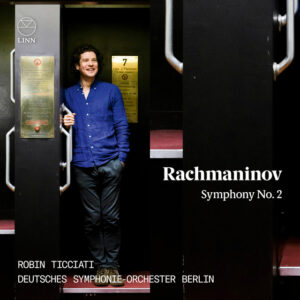GRAMOPHONE Review: Rachmaninov Symphony No.2 – Deutsches Symphonie-Orchester Berlin/Ticciati
 This is very much in keeping with the impression I have always had of Robin Ticciati’s work: exhaustively prepared, immaculately turned, eminently musical. The sense of unfolding over the many, many pages of the introduction, a flower opening in a darkling landscape, petal by petal, layer by layer. But – and this is a very big ‘but’ – there is a self-awareness about it, a refinement, that belies its very Russianness. It feels calculated to please and to be admired. What it doesn’t feel is organic.
This is very much in keeping with the impression I have always had of Robin Ticciati’s work: exhaustively prepared, immaculately turned, eminently musical. The sense of unfolding over the many, many pages of the introduction, a flower opening in a darkling landscape, petal by petal, layer by layer. But – and this is a very big ‘but’ – there is a self-awareness about it, a refinement, that belies its very Russianness. It feels calculated to please and to be admired. What it doesn’t feel is organic.
And so the glorious second subject of the first movement has all of the effulgence with none of the passion and the prolonged ascent to the big development climax somehow or other delivers a thunderous release while still giving the impression that it’s arrived from nowhere.
The scherzo and finale have momentum but no sense of urgency, the rhythmic keenness brilliant and light-catching on the surface (laudable precision from the Deutsches Symphonie-Orchester Berlin) but not driven to my mind by a sense of imperative. And again those two big tunes: the second subject of the scherzo is not possessed of the ‘swoon’ that makes the touches of portamento more than just dutiful and the bigger and more expensive tune of the finale never feels euphoric – not even on its epic return in the coda. I do, though (and I know it’s a tiny detail), like the touch of rhetoric, of pulling back, that Ticciati lends to the fanfare which first ushers it in.
In sum, I think it’s spontaneity that I most miss from the reading – an in-the-moment relish that is so easy to recognise but so hard to define. For instance, I always love the way that the slow movement seems to start mid-sentence as if Rachmaninov had awoken at three in the morning with a thought that needed saying there and then. The long clarinet tune – exquisitely delivered here – is a wee small hours melody if ever there was one – but for all that it is cosmetically beautiful in Ticciati’s account I don’t get the sense, as I do in the classic Previn recording with the LSO, that it is unfolding in the playing of it. I know this is just a feeling but a simple comparison with Previn as we approach the ever more impassioned central climax reveals a freedom and innate sense of the improvisatory in his reading that sweeps all before it.
Ticciati is too busy attending to the music’s every whim ever to allow it free rein. It just doesn’t sound like it’s a part of him yet, or perhaps ever.
You May Also Like

GRAMOPHONE Review: An American Song Album – Melody Moore/Bradley Moore
14/08/2019
A Conversation With VASILY PETRENKO: On Shostakovich
02/09/2010

